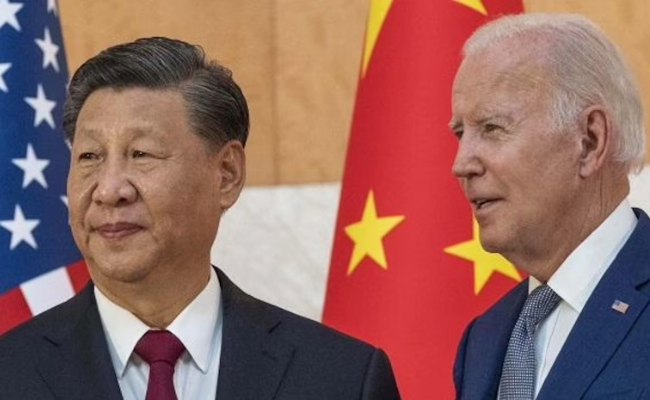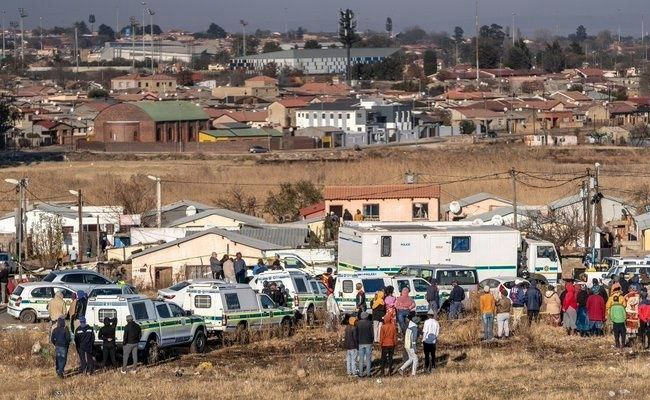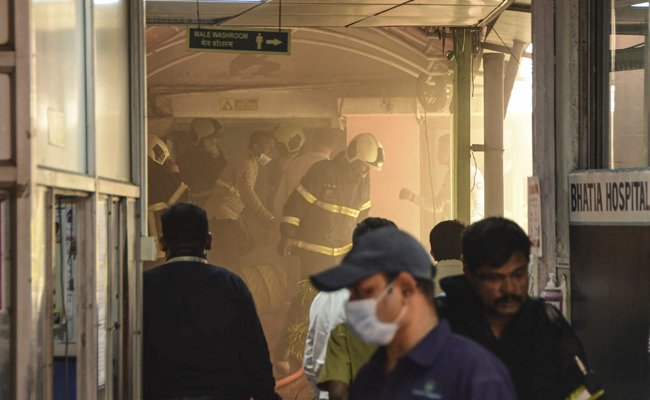Washington (AP): China's top diplomat went into a second meeting with Secretary of State Antony Blinken on Friday as part of a highly watched visit to Washington that could help stabilise US-China ties by facilitating a summit between Biden and Chinese President Xi Jinping.
Wang Yi, the Chinese foreign minister, is scheduled to meet national security advisor Jake Sullivan later Friday and possibly President Joe Biden.
After Wang and Blinken's initial meeting Thursday evening, the Chinese side said "the two sides had an in-depth exchange of views on China-US relations and issues of common concern in a constructive atmosphere".
In its readout, the State Department said the two men addressed "areas of difference" and "areas of cooperation", while Blinken "reiterated that the United States will continue to stand up for our interests and values and those of our allies and partners".
Before Thursday's meeting, Wang said China would seek to "push the relationship as soon as possible back to the track of healthy, stable and sustainable development", raising hopes that the relationship can be steadied.
US officials have said they would press Wang on the importance of China stepping up its role on the world stage if it wants to be considered a responsible major international player. The US has been disappointed with China over its support for Russia in the war against Ukraine and its relative silence on the Israel-Hamas war.
"China should use whatever ability it has as an influential power to urge calm" in the Middle East, said State Department spokesman Matthew Miller. "We know China has relationships with a number of countries in the region, and we would urge them to use those relationships, the lines of communication they have, to urge calm and stability."
US officials believe the Chinese have considerable leverage with Iran, which is a major backer of Hamas.
Wang has come to Washington at a time when tensions between the two countries remain high, including over US export controls on advanced technology and China's more assertive actions in the East and South China seas.
On Thursday, the US military released a video of a Chinese fighter jet flying within 10 feet (three metres) of an American B-52 bomber over the South China Sea, nearly causing an accident. Earlier this month, the Pentagon released footage of some of the more than 180 intercepts of US warplanes by Chinese aircraft that occurred in the last two years, part of a trend US military officials call concerning.
The US also has renewed a warning that it would defend the Philippines in case of an armed attack under a security pact, after Chinese ships blocked and collided with two Filipino vessels off a contested shoal in the South China Sea.
During his three-day trip to Washington, Wang also is expected to discuss Taiwan, a self-governed island that Beijing considers to be part of Chinese territory. Beijing vows to seize it by force if necessary, but Washington, which has a security pact with Taiwan, opposes the use of force.
There has been no official announcement that Biden will meet with Wang. The diplomatic practice of reciprocity suggests it is likely, since Blinken met with Xi when he visited China in June.
Neither side has confirmed whether Biden and Xi will meet next month on the sidelines of an Asia-Pacific Economic Cooperation leaders gathering in San Francisco. But Wang's trip indicates the likelihood is extremely high, said Scott Kennedy, senior adviser and trustee chair in Chinese business and economics at the Washington-based think tank Centre for Strategic and International Studies.
"His visit is most likely about nailing down the agenda and negotiating potential deliverables," Kennedy said.
The Chinese president last came to the US in 2017, when former President Donald Trump hosted him at his Mar-a-Lago resort in Florida. Biden, who took office in 2021, has yet to host Xi on US soil.
The two men last met in Bali, Indonesia, in November 2022, on the sidelines of the Group of 20 meeting of leading rich and developing nations.
The US-China relationship began to sour in 2018 when the Trump administration slapped hefty tariffs on USD 50 billion worth of Chinese goods. It deteriorated further over a range of issues, including rights abuses, the South China Sea, Taiwan, technology and the COVID-19 pandemic.
Let the Truth be known. If you read VB and like VB, please be a VB Supporter and Help us deliver the Truth to one and all.
Johannesburg (AP): A 32-year-old suspect has been arrested in connection with a mass shooting which claimed the lives of 12 people including three children at an unlicensed pub earlier this month, South African police said on Monday.
The man is suspected of being one of the three people who opened fire on patrons in a pub at Saulsville township, west of South Africa's capital Pretoria, killing 12 people including three children aged 3, 12 and 16.
At least 13 people were also injured during the attack, whose motive remains unknown.
According to the police, the suspect was arrested on Sunday while traveling to Botlokwa in Limpopo province, more than 340 km from where the mass shooting took place on Dec 6.
An unlicensed firearm believed to have been used during the attack was recovered from the suspect's vehicle.
“The 32-year-old suspect was intercepted by Limpopo Tracking Team on the R101 Road in Westenburg precinct. During the arrest, the team recovered an unlicensed firearm, a hand gun, believed to have been used in the commission of the multiple murders. The firearm will be taken to the Forensic Science Laboratory for ballistic analysis,” police said in statement.
The suspect was arrested on the same day that another mass shooting at a pub took place in the Bekkersdal township, west of Johannesburg, in which nine people were killed and 10 wounded when unknown gunmen opened fire on patrons.
Police have since launched a search for the suspects.
South Africa has one of the highest homicide rates in the world and recorded more than 26,000 homicides in 2024 — an average of more than 70 a day. Firearms are by far the leading cause of death in homicides.
The country of 62 million people has relatively strict gun ownership laws, but many killings are committed with illegal guns, according to authorities.
According to police, mass shootings at unlicensed bars are becoming a serious problem. Police shut down more than 11,000 illegal taverns between April and September this year and arrested more than 18,000 people for involvement in illegal liquor sales.





